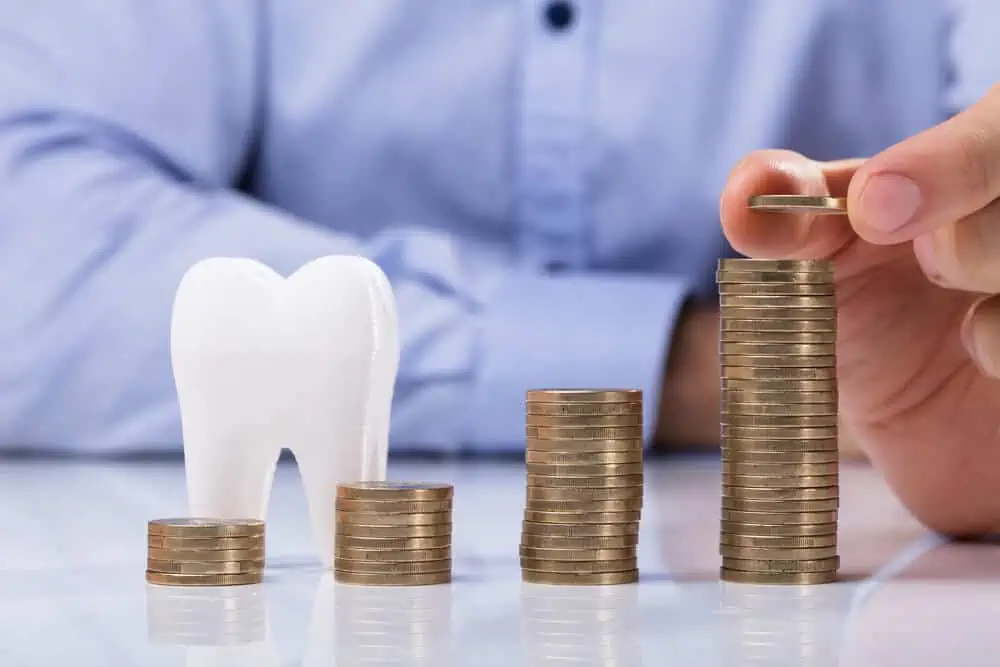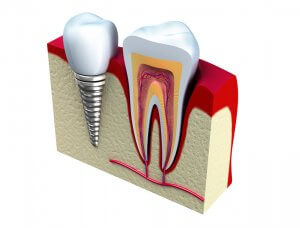A dental payment plan is a dental financing option that lets patients make payments over time. Dental work can be expensive and if you don’t have insurance – or even if you do – it can leave you with a huge bill.
Fortunately, many dentists offer the option of a payment plan, so instead of paying one giant sum, patients can pay in smaller increments over time.
There are different payment plans and different ways to arrange payment with your dentist. Here we explain how dental payment plans work and what to be aware of before you sign up for one.
Armed with this information, you can confidently search for a dentist that takes payment plans near you without worrying about fees and details hidden in the fine print.
You may look into payment plans because you don’t think you can afford dental insurance. However, there are plenty of affordable plans available, and even some with no waiting period.
Dentalinsurance.com makes it easy to browse and compare plans in your area. They also offer dental discount plans and you can speak to a helpful, licensed agent at 888-626-0057 if you need help.
In This Article
How do dental payment plans work?
Before we begin —
You can compare the best plans in your area now! Enter your zip code and DOB below to get your free quote.

A dental payment plan lets you spread out the costs of your dental treatment over time. These plans are especially helpful if you don’t have dental insurance, or if your insurance doesn’t cover the cost of your treatment.

Payment frequency
Some payment plans require weekly payments, and some require monthly payments. Furthermore, some payment plans are interest-free during the entire payment period, while others may start out interest-free and then charge interest later on.
Where the money comes from
To offer payment plans, dentists have an arrangement with a third-party finance company. Many dentists have arrangements in place with a particular company, but you may be able to arrange your own financing separately if you choose.
It’s important to note that a payment plan may not be accepted by all dental providers, so you should consult yours first before pursuing this option.
Not a discount plan
Please also note that a dental payment plan is different from a dental discount plan (often just called a ‘dental plan’). Payment plans are not a type of insurance, just a way to spread the cost of your treatment to make it more affordable. This is similar to a loan, but the terms of the agreement with your dentist are different.
How payment plans for dental work
Keep reading for some important things to consider before you look at payment plans for dental care. You can also watch the video below which explains how payment plans work for both dentists and patients:
Dentists with payment plans near me
Many dental clinics in the US offer dentistry payment plans. The obvious place to start is your regular dentist. If they don’t offer payment plans, they might be able to suggest a nearby clinic that does.
You can also call 866-383-0748 to find a dentist who offers payment plans in your area. You’ll be connected with a live operator who can direct you to a dentist near you.
Alternatively, you could begin by researching dental plan providers and finding one that has terms you’re happy with. You can then use their website to search for dentists near you that participate in their payment plan scheme.
If you can’t find a dentist with payment plans near you, or if none of the plans offered suits you, a dental loan or credit card could be a suitable alternative.
Ask your dentist about direct payment plans
You might expect that your dentist receives a commission on any third-party financing arranged through them. In fact, the opposite is true – they usually have to pay a fee to the provider. This can be anywhere from 5% to 15% of the total plan value, which is no small amount.

The reason why dentists are willing to pay this fee is that it helps attract more patients and keep them fully booked. They receive the full payment for your treatment (minus the fee) within a few days rather than waiting months for it. And if you default on your payments, it’s not their problem.
But you can also see why they might be willing to arrange a dentistry payment plan directly with you – it could save them some money.
A few things to bear in mind before asking about this:
- You’ll stand a better chance of your dentist agreeing to this if it’s not your first time visiting them
- You’ll still have to pay a chunk up-front – probably a third or half of the total fee
- Expect the payment term to be shorter than with a third party (maybe just a few months)
- You may still receive a discount on any amount you can pay up-front in cash
Ultimately, there is no harm in asking your dentist for a discount and/or a few extra months to make your payments.
Dental payment plans: things to consider
The companies that provide dental finance need to make money somehow. Some might be happy with just the fee from the dentist, but most will try to make a profit from you as well.
Before you choose a plan provider, check the terms and conditions for the following things:
Interest rates
One obvious way for the finance company to make money is through interest. Although some offer 0% interest, at least for a fixed term, others charge rates that may be even higher than your credit card.
Always check the rate you’re being offered and compare it to your other options, such as a personal loan or credit card. In the US, the CareCredit credit card offers special terms for medical bills, including zero interest for up to two years. Of course, if you do use a credit card, make sure you still make the regular monthly payments to avoid your bill growing even bigger.
If you find a 0% interest payment plan, check how soon you have to complete your repayments. There might be a fixed term of one or two years, after which the interest rate shoots up. Do everything possible to clear your debt while it’s still interest-free.
Plans that charge interest may offer a longer term, meaning lower monthly payments, but always look at how much you’ll pay back in total.

Administration or application fees
Does the finance company charge a fixed fee for arranging your payment plan? These can be hidden away in the monthly repayments so be sure to check.
Early repayment penalties
What if you realize you have the means to repay your loan early? This could save you some money on interest, which is why finance companies often don’t allow it, or at least charge a penalty fee. A payment plan without this penalty will give you the freedom to complete your repayments earlier than planned, if you wish.
Late payment penalties
You can expect to be charged a fee if you fall behind on your payment schedule. Some companies may be more lenient than others, though; check the terms of your plan so you’re aware of any penalties.
Credit checks
If you have a poor credit history, you’ll need to look specifically for dental payment plans for bad credit.
The simplest solution is probably to use a plan provider that doesn’t do credit checks, such as iCare. These plans are usually arranged directly with your dentist and give you instant approval. This means you can begin your treatment right away.
Can you make payments on dental implants?
Just like with any other treatment, there are payment plans for implants available. Since implants are such an expensive procedure, it will be even more important to make sure that you can make the payments in time, lest your interest rates skyrocket.
Other ways to pay for dental treatment
Let’s first look at the different ways you can pay for your dental care. Free dental care may be an option for certain individuals, but most patients will have to pay something.
And it’s important to have a way to finance your dental care — after all, according to a survey by the Kaiser Family Foundation, 41% of adults have medical or dental debt.
Do keep in mind, that based on your income level, especially if you are pregnant or have children, you may be eligible for programs like Medicaid or CHIP (for children). For more information on free dental care and government-funded programs like Medicaid, you can read our article on Medicaid here.
1. Dental insurance
There are two basic types of dental insurance:
- Health Maintenance Organizations (HMOs): These plans provide access to in-network providers. They cost less but require referrals to see specialists.
- Preferred Provider Organizations (PPOs): Individuals can access healthcare providers in and out of network. These plans tend to cost more, but don’t usually require referrals to see specialists.
If you have dental insurance or a dental discount plan, either privately or through your employer, first check to see if there are any restrictions on which dentist(s) you may visit. Even if you have a plan that lets you visit any dentist you choose, you will probably receive preferential rates from approved dentists within your insurance provider’s network.
Read more about the best dental insurance providers in the US.
While services like checkups and cleanings are often included for free, for any other treatment you’ll probably receive a percentage discount or pay a reduced fee. The discount can be anywhere from 10% to 80% of the total treatment cost, depending on the level of insurance you have.

With private treatment plans, any discounts are usually subject to an annual limit, and there is often a separate lifetime limit in place for orthodontics. This means you may still have significant out-of-pocket costs for treatments like:
- Dental implants
- Braces
- Oral surgery
- Dentures
- Root canal work
- Wisdom teeth extractions
- Sedation and general anesthesia
In this case, you may still want to arrange dental finance for the portion not covered by your insurance.
Also, keep in mind that insurance usually won’t cover any purely cosmetic work like veneers. Some US insurers do offer an allowance for teeth whitening, though.
If you’re worried that you can’t afford the dental treatment you need because you don’t have insurance, did you know that many dental plans offer immediate cover for preventive, diagnostic, and basic restorative services?
You might have to wait 6-12 months for more complex work such as root canal treatment and wisdom teeth extractions to be covered, but it’s worth checking your options.
We have a full article on dental insurance plans in the US if you want to know more about this topic.
2. Pay your dentist directly
Unfortunately, paying your dentist directly is not the best solution if you’re looking for cheap dental care without insurance.
Although if you do so, they may offer you a discount of around 5-10% — but the cost of the treatment is usually too expensive for this to be a viable option.

Even if you can’t afford to pay in full, your dentist may be willing to arrange an in-house payment plan. You might, for example, pay one-third of the treatment cost up-front with the balance spread over the next six months. Again, this is more likely to be an option if you’re a long-term patient with a good history.
If you do want to pay for your treatment upfront, then more reasonable treatment costs may be found at federally-funded health community centers or dental schools.
3. Get a dental loan
You can take out a loan for your dental work, which is actually a personal loan, just as you might do for a car or another big purchase.
Taking out a dental loan lets you pay for your treatment immediately (so you may get some of the benefits mentioned above). You then repay the loan over several months or years, depending on your loan term.
Before taking out a loan, always make sure that you will be able to pay it back within the payment deadline. These loans have certain eligibility requirements, interest rates, and repayment requirements that you will need to consider as well.
If you’d like to see what your options are for taking out a loan, SuperMoney has a comprehensive loan search engine where you can find and compare personal loans for dentistry. You can click on the button below to get started.
4. Dental discount plans
Dental discount plans are another way to save money on dental care, especially if you want to get routine care, but you can’t afford normal insurance plans with premiums, deductibles and maximums.
With a discount plan, you pay an annual fee and in return, you receive discounted dental care. Dental discount plans are less expensive than insurance plans and help many patients save a lot, especially on routine and preventative care like cleanings, but they can also be used for more expensive treatment like dental implants as well.
To find out more about dental discount plans, you can check out our dental savings plan article.
You can also go to DentalInsurance.com where you can browse the best dental savings plans and insurance plans in your state. Click the button below to get started. All you have to do is enter your zip code and date of birth and you’ll see the best plans available to you.
Other ways to save on dental payments
Payment plans and insurance aren’t the only way to make dental care more affordable. Here are some other tips for cutting the cost of your dentist bill, or at least making it easier to manage:

- Shop around dentists near you: Treatment costs can vary considerably from one dentist to another. Fees depend on their location, experience, and business overheads, amongst other things. In addition, certain dentists may have special arrangements with manufacturers of particular brands of braces, implants, veneers, etc.
- Visit a community health center: Federally-funded community health centers often offer discounted treatment options.
- Plan your treatment carefully: If you need a lot of dental care, ask your dentist about a treatment plan that will help spread the cost. This might mean doing the most urgent procedures first and then waiting a few months before completing less essential work.
- Consider traveling abroad: Depending on the work you need, you might save a lot by visiting a dentist overseas. Dental implants, for example, can cost 50-70% less in other countries. Mexico and Costa Rica are popular for US visitors doing dental tourism because of the short travel time. Patients wanting dental veneers or any kind of extensive treatment plan should also consider getting the work done abroad.
- Take good care of your teeth: It might sound obvious, but really, the best way to cut your dental bills is to keep your mouth and teeth healthy. This means brushing and flossing properly as well as having regular checkups. If your dentist has the chance to spot problems early on, treatment will be a lot cheaper than if you leave it to develop into something more serious. You’ll also reduce your chances of needing expensive implants or dentures later in life.
Conclusion
Dental payment plans can help make your dental care more affordable by spreading the cost over a period of time. If you need a payment plan for upcoming dental work, your next step is to search for a local dentist with payment plans near you.
You can also ask your current dentist if they’d be willing to offer you a payment plan. Before you sign on to a plan, make sure you understand the plan details including if there are interest rates, and when they kick in.
You might also want to consider a dental insurance plan or a dental savings plan. There are plenty of plans available and you might be surprised at how affordable some of them can be. To search for a dental insurance plan, you can go to DentalInsurance.com.
This online marketplace makes it easy to browse plans in your area, and enrol right on the spot. Plus, if you need guidance, you can call 888-626-0057 to speak with one of their helpful, licensed agents.
FAQs
Will dentists take payment plans?
Many dentists partner with third-party providers to offer payment plans to make dental care more affordable to their patients. Your dentist may accept a payment plan for expensive procedures.
How long are dental payment plans?
Dental payment plans aren’t a dental insurance plan with a yearly renewal. Instead, they are ways to spread out payments for dental treatment over time so you don’t have to pay a huge sum all at once. Your dental payment plan will last as long as you and your dentist decide it should take for you to complete payment for your treatment.
Does Aspen Dental have payment plans?
Aspen Dental clinics offer payment plans to help patients pay for treatment over time. They accept third-party financing and also accept various payment options. Aspen accepts cash, credit cards, third-party credit, and other financing options.
Kff.org: Health Care Debt in the U.S.: The Broad Consequences of Medical and Dental Bills. Consulted 11th July 2021.





